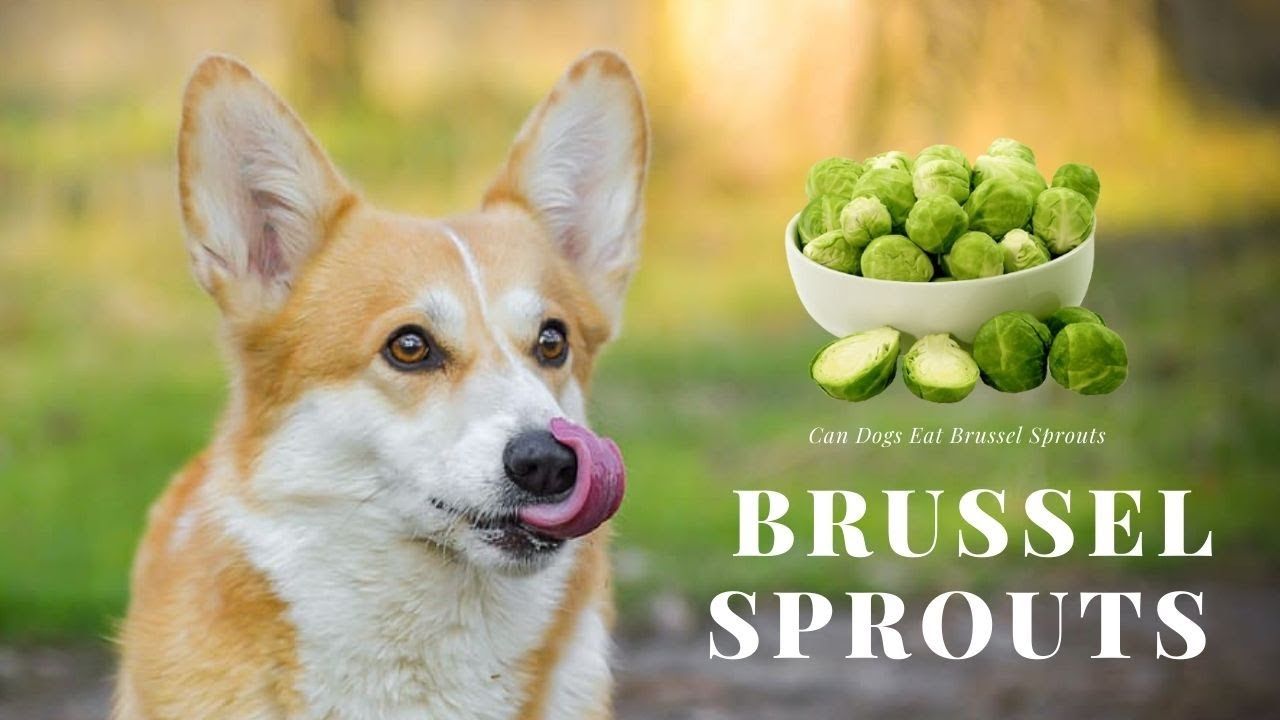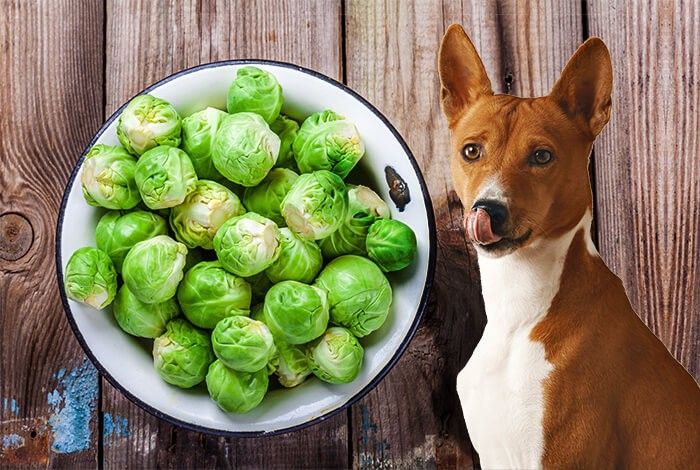Brussels sprouts have gained quite a reputation among health-conscious humans. These miniature cabbages are packed with nutrients and offer a unique taste that many people appreciate. But what about our canine companions? Can dogs eat Brussels sprouts? In this article, we will explore the safety and potential benefits of including Brussels sprouts in your dog's diet while addressing the associated risks.

Are Brussels Sprouts Safe for Dogs?
Brussels sprouts are indeed safe for dogs in moderation. They are rich in essential nutrients like vitamins C and K, fiber, and antioxidants, which can contribute to your dog's overall health. However, like any food, Brussels sprouts should be introduced cautiously and in appropriate amounts.
Nutritional Value of Brussels Sprouts
Brussels sprouts, those miniature green wonders, are not just a treat for your taste buds but also pack a substantial nutritional punch. When considering whether to include them in your dog's diet, understanding their nutritional value is paramount.
Key Nutrients in Brussels Sprouts
Vitamins:
Brussels sprouts are a rich source of essential vitamins, including vitamin C and vitamin K. Vitamin C supports your dog's immune system and helps with wound healing, while vitamin K plays a vital role in blood clotting and bone health.
Fiber:
These green veggies are also loaded with fiber, which can aid in digestion and maintain a healthy gut. Fiber is particularly beneficial for dogs prone to constipation.
Antioxidants:
Brussels sprouts contain antioxidants such as beta-carotene and lutein. Antioxidants help combat free radicals in your dog's body, potentially reducing the risk of chronic diseases.
Minerals:
Minerals like potassium and manganese are found in Brussels sprouts. Potassium is essential for proper muscle and nerve function, while manganese contributes to bone formation and overall growth.

Comparison to Canine Dietary Requirements
To gauge whether Brussels sprouts align with your dog's dietary needs, it's crucial to consider the following:
Digestibility:
While Brussels sprouts are nutrient-rich, they can be challenging for dogs to digest. Their complex carbohydrates may lead to gas and discomfort in some cases.
Calories:
Brussels sprouts are relatively low in calories, which can be advantageous for dogs that need to maintain or lose weight. However, they should still be treated as an occasional addition rather than a staple.
Balanced Diet:
Remember that while Brussels sprouts offer numerous benefits, they should complement a well-balanced diet that meets all of your dog's nutritional requirements.
In summary, Brussels sprouts are a nutritional powerhouse, offering vitamins, fiber, antioxidants, and minerals that can benefit your dog. However, their digestibility and calorie content should be taken into account when deciding how often and in what quantities to include them in your dog's meals.
Digestibility and Gas Concerns
When contemplating whether to introduce Brussels sprouts into your dog's diet, it's essential to delve into the digestive aspects and address concerns related to gas and bloating.
Digestibility of Brussels Sprouts for Dogs
While Brussels sprouts are a nutritional powerhouse for humans, they contain certain components that can challenge a dog's digestive system. The primary culprit is their high fiber content, which can be tough for some dogs to break down efficiently.
Potential Digestive Discomfort:
The fiber in Brussels sprouts may cause digestive discomfort in dogs, leading to gas, bloating, or even diarrhea. This discomfort can vary depending on the individual dog's tolerance.
Cooking and Preparation:
Proper cooking and preparation can aid in making Brussels sprouts more digestible for dogs. Lightly steaming or boiling them can soften the fibers, making them easier for your dog to process.
Gas and Bloating Concerns
One of the most common concerns when feeding dogs Brussels sprouts is the potential for increased gas production. Here's what you need to know:
Gas Production:
Brussels sprouts contain sugars and fibers that can ferment in a dog's stomach, leading to the release of gases. This can result in flatulence and discomfort.
Portion Control:
To minimize the risk of excessive gas, it's crucial to practice portion control when offering Brussels sprouts to your dog. Start with small amounts and monitor their reaction.
Individual Variability:
Keep in mind that individual dogs react differently to Brussels sprouts. Some may tolerate them well, while others may experience more significant gas and discomfort.
Preparation and Cooking Methods
When it comes to incorporating Brussels sprouts into your dog's diet, the preparation and cooking methods you choose play a crucial role in ensuring their safety and palatability.

Safe Preparation Steps
1. Wash Thoroughly: Before anything else, ensure that you wash Brussels sprouts thoroughly to remove any dirt or pesticides. This step is vital to prevent any harmful substances from reaching your dog's system.
2. Remove Outer Leaves: Peel away the outer leaves of Brussels sprouts, as they can be tough and challenging to digest. This also helps reduce the risk of choking.
3. Slice or Dice: For smaller dogs or those with sensitive digestive systems, consider slicing or dicing the Brussels sprouts into smaller, more manageable pieces. This promotes easier digestion.
Cooking Methods
1. Steaming: Steaming Brussels sprouts is one of the healthiest ways to prepare them for your dog. It softens the sprouts while retaining their nutritional value. Avoid adding any seasonings or sauces.
2. Boiling: Boiling Brussels sprouts until they are tender but not mushy is another suitable method. Be sure to cool them down before serving, and avoid using salt or butter.
3. Blending or Mashing: For dogs with dental issues or smaller breeds, consider blending or mashing the cooked Brussels sprouts into their regular food. This makes it easier for them to consume.
4. Avoid Seasonings: Never add seasonings, spices, butter, or oils to Brussels sprouts for your dog. These can be harmful to your pet and should be avoided entirely.
Incorporating Brussels sprouts into your dog's diet can be a healthy choice, but the key is to keep the preparation simple and free from any additives that could be harmful. By following these preparation and cooking methods, you can offer your furry friend a safe and nutritious treat.
Moderation is Key
When it comes to feeding Brussels sprouts to your dog, moderation is the golden rule. While these green gems offer several health benefits, overindulgence can lead to digestive discomfort and other potential issues.
Appropriate Portion Control
1. Start Small: When introducing Brussels sprouts to your dog's diet for the first time, start with a small portion. This allows you to gauge their tolerance and any potential adverse reactions.
2. Observe Your Dog: Pay close attention to how your dog responds to Brussels sprouts. Some dogs may tolerate them well, while others may experience gas, bloating, or diarrhea.
3. Adjust Serving Size: Based on your dog's response, you can gradually increase the serving size if they tolerate Brussels sprouts without any issues. However, always maintain portion control.
Frequency of Feeding
1. Occasional Treat:
Brussels sprouts should be considered an occasional treat rather than a regular part of your dog's diet. Reserve them for special occasions or as an occasional addition.
2. Balance the Diet:
Remember that Brussels sprouts should complement a balanced diet that meets all of your dog's nutritional requirements. They should not replace essential elements of their regular meals.
Individual Variability
1. Tolerance Varies:
Keep in mind that every dog is unique, and their tolerance for Brussels sprouts can vary. Some may digest them with ease, while others may experience digestive issues.
2. Consult with Your Vet:
If you have any concerns about your dog's diet or their reaction to Brussels sprouts, it's advisable to consult with your veterinarian. They can provide personalized guidance based on your dog's specific needs.
Health Conditions and Allergies
1. Gastrointestinal Sensitivity:
- Dogs with sensitive stomachs or a history of digestive issues may struggle to digest Brussels sprouts. Gas, bloating, and diarrhea are potential outcomes.
2. Food Allergies:
- Some dogs may be allergic to certain vegetables, including Brussels sprouts. Allergic reactions can manifest as skin irritation, itching, or gastrointestinal distress.
Medical Considerations
1. Medical Conditions:
- Dogs with specific medical conditions, such as pancreatitis, should avoid high-fat dog foods like Brussels sprouts, as they can exacerbate the condition.
2. Medications:
- If your dog is on medications or has a chronic medical condition, consult with your veterinarian before introducing Brussels sprouts, as they can interact with certain drugs.
Individual Preferences
1. Picky Eaters:
- If your dog is a picky eater and consistently rejects Brussels sprouts, it's best not to force them. There are alternative vegetables to consider.

Consult Your Veterinarian
1. Professional Advice:
- If you're unsure whether Brussels sprouts are suitable for your dog, consult with your veterinarian. They can assess your dog's individual needs and provide guidance tailored to their health.
In summary, Brussels sprouts may not be suitable for all dogs, especially those with sensitivities, allergies, or underlying medical conditions. It's crucial to prioritize your dog's well-being and consult with a veterinarian when in doubt about their dietary choices.
Other Vegetables for Your Dog
If Brussels sprouts aren't a good fit for your dog, there are plenty of other vegetables that can offer similar nutritional benefits. Diversifying your dog's diet with safe and nutritious alternatives can be a great choice.
1. Carrots:
- Carrots are an excellent source of vitamins and fiber. They make for a crunchy and low-calorie snack that many dogs enjoy.
2. Sweet Potatoes:
- Rich in vitamins A and C, as well as fiber, sweet potatoes are a nutritious choice. They can be served cooked or mashed.
3. Green Beans:
- Green beans are low in calories and high in fiber. They're a great option for dogs looking to maintain a healthy weight.
4. Peas:
- Peas provide vitamins, minerals, and fiber. They can be served fresh or frozen after blanching.
5. Pumpkin:
- Canned plain pumpkin (not pumpkin pie filling) is rich in fiber and can aid in digestion. It's often used to alleviate constipation.
6. Broccoli:
- Like Brussels sprouts, broccoli contains essential nutrients, but it should also be served in moderation due to its potential to cause gas.
7. Zucchini:
- Zucchini is low in calories and high in water content, making it a hydrating and healthy option.
8. Spinach:
- Spinach is a leafy green packed with vitamins and iron. It's best served cooked and in small quantities due to its oxalate content.
Always introduce new vegetables gradually into your dog's diet, and monitor their reaction for any adverse effects. Remember that variety can be beneficial, and consulting with your veterinarian about the best vegetable options for your specific dog is advisable.
Introducing Brussels Sprouts to Your Dog
Introducing Brussels sprouts to your dog's diet requires a careful and gradual approach to ensure their comfort and well-being. Here are the steps to follow:

1. Start Slowly
Begin by offering a small, well-cooked Brussels sprout to your dog as a treat. This initial exposure will allow you to gauge their reaction.
2. Observe for Adverse Reactions
Watch your dog closely after they consume the Brussels sprout. Look for any signs of digestive discomfort, including excessive gas, diarrhea, or vomiting. If you notice any adverse reactions, discontinue feeding them Brussels sprouts immediately.
3. Adjust the Serving Size
If your dog tolerates Brussels sprouts well during the initial trial, you can gradually increase the serving size over time. However, always maintain moderation.
4. Mix with Regular Food
To make the transition smoother, you can mix small amounts of cooked Brussels sprouts with your dog's regular food. This will help them become accustomed to the new addition.
5. Steamed or Boiled Brussels Sprouts
Opt for steamed or boiled Brussels sprouts, as these cooking methods soften the fibers and make the vegetables more digestible for your dog.
6. Avoid Seasonings
Never add seasonings, spices, salt, or butter to Brussels sprouts when preparing them for your dog. These additives can be harmful to your pet.
7. Monitor Over Time
Continuously monitor your dog's response to Brussels sprouts as you incorporate them into their diet. Remember that individual tolerance varies, and some dogs may react differently than others.
Common Misconceptions
There are many misconceptions surrounding Brussels sprouts and dogs. We'll debunk myths and provide evidence-based information to help you make informed decisions.
Consulting Your Vet
Before making any significant changes to your dog's diet, it's crucial to consult your veterinarian. They can provide personalized guidance based on your dog's specific needs and health condition.
Conclusion
In conclusion, dogs can eat Brussels sprouts, but it should be done in moderation and with careful consideration. These vegetables can offer health benefits but also come with potential risks. Always prioritize your dog's well-being and consult with your vet for guidance.
FAQs
1. What are the potential health benefits of feeding Brussels sprouts to dogs?
Brussels sprouts can provide essential vitamins, fiber, and antioxidants that may support your dog's immune system, skin, and coat health.
2. Can Brussels sprouts be a regular part of my dog's diet?
While they can be a part of your dog's diet, it's best to offer them in moderation and ensure a well-balanced diet overall.
3. How can I introduce Brussels sprouts to my picky eater?
Introduce Brussels sprouts gradually and observe your dog's reaction. You can also mix them with their regular food to make the transition smoother.
4. Are there any risks associated with feeding Brussels sprouts to dogs?
Yes, there can be risks, including digestive issues and gas. Overconsumption should also be avoided.
5. What should I do if my dog shows signs of discomfort after eating Brussels sprouts?
If your dog experiences any discomfort, stop feeding them Brussels sprouts immediately and consult your veterinarian for advice.
In this article, we've unraveled the mystery surrounding whether dogs can eat Brussels sprouts. Remember that while these vegetables can be a nutritious addition to your dog's diet, responsible feeding practices are crucial. Always prioritize your dog's health and consult your vet when in doubt.




